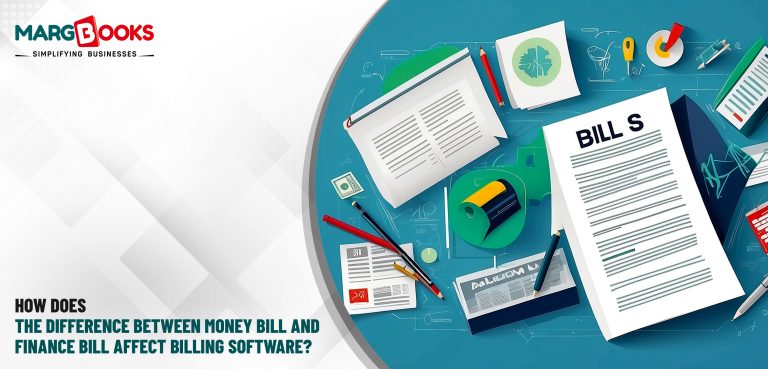In the world of finance and governance, we often hear terms like Money Bill and Finance Bill being used, especially around budget sessions in the Parliament. But have you ever wondered how these bills, which are essentially legislative tools, impact the world of technology – especially something as specific as Billing Software?
Let’s break it down in a way that’s easy to understand, and explore how these government decisions affect not just big businesses, but also the tools they use to manage day-to-day operations like invoicing, taxation, and billing.
What is a Money Bill?
A Money Bill is a type of bill in the Indian Parliament that deals exclusively with matters related to money – like taxation, borrowing of money by the government, expenditure from or receipt into the Consolidated Fund of India, and so on.
According to Article 110 of the Indian Constitution, a bill is considered a Money Bill if it contains only provisions related to the following:
- Imposition, abolition, remission, alteration or regulation of taxes
- Borrowing of money by the government
- Custody of the Consolidated or Contingency Fund of India
- Appropriation of money from the Consolidated Fund
- Receipt or audit of money into the government’s accounts
A key feature of a Money Bill is that it can only be introduced in the Lok Sabha, and the Rajya Sabha has limited powers over it.
What is a Finance Bill?
Now, a Finance Bill is a broader term. Every year, right after the Union Budget is presented, a Finance Bill is introduced to give effect to the government’s financial proposals.
Here’s where it gets a bit technical: all Money Bills are Finance Bills, but not all Finance Bills are Money Bills. A Finance Bill may contain matters related to taxation and other financial provisions which may not fall strictly under the definition of a Money Bill.
Finance Bills are classified into:
- Finance Bill (Category I): Also called a Money Bill
- Finance Bill (Category II): Contains financial provisions that do not qualify as a Money Bill
Why Does This Matter for Billing Software?
You might be wondering – this sounds very legislative. What does it have to do with Billing Software or your everyday billing needs?
The answer lies in how these bills impact taxation laws and financial regulations, which in turn affect the features and updates required in billing software like MargBooks and other online billing software platforms.
Let’s dig deeper.
Impacts of Money Bill and Finance Bill on Billing Software
1. Changes in Taxation Structure
When a Finance Bill or Money Bill is passed, especially during the Budget, it often includes amendments to tax slabs, GST rates, surcharge percentages, and more.
How billing software is affected:
- Automatic updates are required in tax calculation modules.
- GST invoice formats may need modification.
- Businesses using offline or outdated billing systems may struggle to stay compliant.
For instance, if the Finance Bill proposes a change in the GST rate for FMCG goods, MargBooks (a leading billing and inventory software in India) quickly rolls out updates so that users don’t have to manually calculate or change anything.
2. Compliance with Regulatory Norms
Both bills can lead to the introduction of new financial regulations. These may include new tax codes, exemptions, cess, or even rules for digital payments.
Billing software platforms must:
- Adapt to new compliance requirements
- Update their tax audit reports and return filing modules
- Help businesses stay aligned with government norms
Platforms like MargBooks stay ahead by issuing regular updates aligned with the Ministry of Finance guidelines. This ensures businesses using their software stay compliant without any extra effort.
3. Real-Time Data Syncing with Government Portals
Modern online billing software is often integrated with GSTN (Goods and Services Tax Network), e-Invoice portals, and e-Way Bill systems.
A Money Bill or Finance Bill that introduces changes in digital compliance mandates (such as e-invoicing thresholds) directly affects how billing software interacts with government systems.
Key impacts include:
- Modifications in API connections
- New mandatory fields in invoice templates
- Change in frequency or format of data reporting
With MargBooks, users are alerted and guided through any such updates, making transitions smooth and error-free.
Why Businesses Should Care
Whether you run a retail shop, a manufacturing unit, or a service-based startup, changes introduced by the Money Bill and Finance Bill trickle down to your accounting books and invoices. If your billing solution doesn’t adapt quickly, it could lead to:
- Penalties for non-compliance
- Incorrect tax filings
- Loss of customer trust due to invoice errors
That’s why choosing a robust, adaptive online billing software like MargBooks becomes essential. It offers GST-ready features, inventory management, and auto-updates in line with government laws – ensuring you’re never caught off guard when Parliament passes a new bill.
Conclusion
While the difference between a Money Bill and Finance Bill might seem like a concern only for lawmakers and economists, its impact on business tools like billing software is undeniable. These legislative decisions set the stage for financial policy in the country, and every change-big or small-must be mirrored in the software used by businesses to stay compliant and competitive.
So, the next time you hear about the Union Budget or a Finance Bill being introduced, remember-it’s not just news. It could be the start of new updates for your online billing software. And with trusted platforms like MargBooks, staying ahead is easier than ever.




